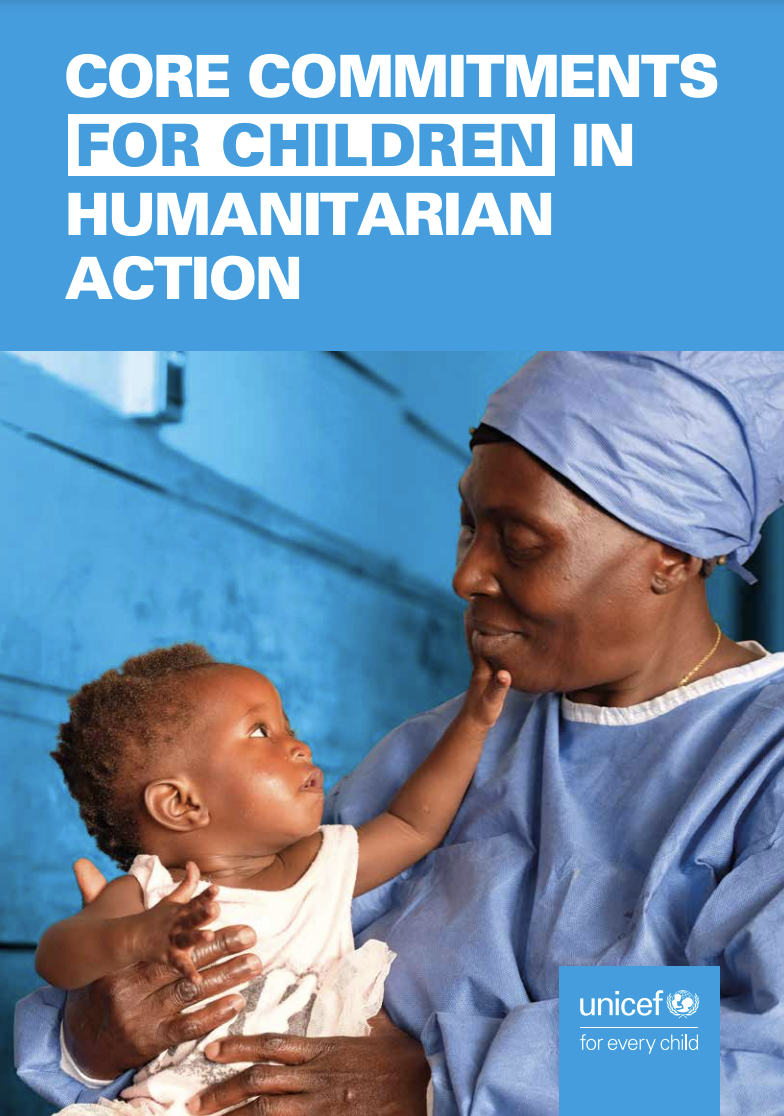Core Commitments for Children Humanitarian Action
Description
Since the Core Commitments for Children in Humanitarian Action (CCCs) were introduced in 1998 and revised in 2010, the global humanitarian context has changed significantly. Humanitarian crises are increasingly protracted. Rising disregard for international humanitarian and human rights law and humanitarian principles characterizes conflicts, disproportionally affecting children and women. Population growth, urbanization, environmental degradation and climate change, large-scale migration, forced displacements, as well as public health emergencies increasingly compound the threats that children face. The CCCs have been revised to equip UNICEF and its partners to deliver principled, timely, quality and child‑centred humanitarian response and advocacy in any crises with humanitarian consequences.
The CCCs form the core UNICEF policy and framework for humanitarian action and are mandatory for all UNICEF personnel. Grounded in global humanitarian norms and standards, the CCCs set organizational, programmatic and operational commitments and benchmarks against which UNICEF holds itself accountable for the coverage, quality and equity of its humanitarian action and advocacy.
In addition, they guide every stakeholder, including governments and civil society organizations (CSOs), in designing their humanitarian action and in setting and meeting standards for respecting, protecting and fulfilling the rights of children.
Humanitarian action for UNICEF encompasses interventions aimed at saving lives, alleviating suffering, maintaining human dignity and protecting rights of affected populations, wherever there are humanitarian needs, regardless of the kind of crisis (sudden-onset or protracted emergencies, natural disasters, public health emergencies, complex emergencies, international or internal armed conflicts, etc., irrespective of the Gross National Income level of a country (low, middle or high), or legal status of the affected populations. Humanitarian action also encompasses interventions addressing underlying risks and causes of vulnerability to disasters, fragility and conflict, such as system strengthening and resilience-building, which contribute to reducing humanitarian needs, risks and vulnerabilities of affected populations.
The CCCs:
- Are guided by international human rights law, particularly the Convention on the Rights of the Child (CRC) and its Optional Protocols, and international humanitarian law
- Apply in all countries and territories, in all contexts, and to all children affected by humanitarian crisis, based on rights and needs, regardless of their country’s state of political, civil, economic and social development or the availability of UNICEF resources
- Provide a menu of minimum commitments, activities, benchmarks and standards that UNICEF commits to achieve in humanitarian crises, with its partners
- Are grounded in the Sphere standards, including the Core Humanitarian Standard on Quality and Accountability (CHS), the Inter-Agency Network for Education in Emergencies (INEE) Minimum Standards, Minimum Standards for Child Protection in Humanitarian Action (CPMS); and reflect UNICEF’s Inter-Agency Standing Committee (IASC) commitments
- Are grounded in the Principles of Partnership: equality, transparency, results-oriented approach, responsibility and complementarity to enable predictable and timely collective humanitarian action
- Contribute to the Sustainable Development Goals (SDGs) and include explicit strategies to link humanitarian and development action, strengthen local capacity and systems and build resilience at all stages of humanitarian action
- When relevant and feasible, without prejudice to the humanitarian principles of neutrality, impartiality and independence, contribute to the UN system-wide agenda for Sustaining Peace
Additional languages


